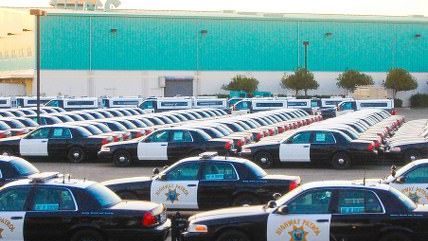The Washington Post Offers Another Wake-Up Call on Aggressive Police Asset Seizures


How law enforcement agencies abuse asset forfeiture laws to bankroll their various budgets to the tune of billions is the focus of a big three-part investigation at The Washington Post. Two parts have been published already; the third part will be published Tuesday.
The horrifying basics are probably already likely known to regular Reason readers. Law enforcement agencies are seizing millions in cash from drivers without any proof these citizens have engaged in illegal behavior, and these people have an uphill battle to get their money back. The Post notes that only one-sixth of asset forfeitures are even challenged, but when they are challenged, the government ends up agreeing to return the money 41 percent of the time.
What's new for those of us who have been following asset forfeiture abuse for years? The Washington Post delves into a private for-profit firm named Desert Snow, which trains officers to detect suspicious behavior in people they've stopped in order to justify searches (such notable things as being nervous and having litter in the vehicle) and encouraging officers to casually ask drivers to allow for searches after the stop is "officially" over and the driver cited (or not) for unrelated violations. The firm also created an information network called Black Asphalt that law enforcement officers used to privately share reports and information between agencies online:
Operating in collaboration with the U.S. Drug Enforcement Administration, Immigration and Customs Enforcement and other federal entities, Black Asphalt members exchanged tens of thousands of reports about American motorists, many of whom had not been charged with any crimes, according to a company official and hundreds of internal documents obtained by The Post. For years, it received no oversight by government, even though its reports contained law enforcement sensitive information about traffic stops and seizures, along with hunches and personal data about drivers, including Social Security numbers and identifying tattoos.
Black Asphalt also has served as a social hub for a new brand of highway interdictors, a group that one Desert Snow official has called "a brotherhood." Among other things, the site hosts an annual competition to honor police who seize the most contraband and cash on the highways. As part of the contest, Desert Snow encouraged state and local patrol officers to post seizure data along with photos of themselves with stacks of currency and drugs. Some of the photos appear in a rousing hard-rock video that the Guthrie, Okla.-based Desert Snow uses to promote its training courses.
Annual winners receive Desert Snow's top honorific: Royal Knight. The next Royal Knight will be named at a national conference hosted in Virginia Beach next year in collaboration with Virginia State Police.
I would embed the video referenced above but it appears to have been removed from YouTube by the user. Imagine that.
And despite the frequent defenses by law enforcement that asset forfeiture isn't about snagging money for themselves but taking tools away from the evil drug lords, there's plenty of evidence that they know otherwise:
Desert Snow officials in interviews disclaimed the practice of targeting drivers for money, sometimes known as "policing for profit." They said that seizing cash is a proven tool for hurting drug and crime organizations.
But privately, they promote a book that extols the quest for cash. Ron Hain, a marketing official with Desert Snow and a full-time deputy sheriff in Kane County, Ill., has urged police to use cash seizures to bolster municipal coffers. "In Roads: A Working Solution to America's War on Drugs," a book Hain self-published under the pen name Charles Haines in 2011, states that departments can "pull in expendable cash hand over fist."
Read The Washington Post's first two stories here and here. And consult Reason's lengthy history of writing on asset forfeiture abuse here.
Elsewhere, the Institute for Justice, which is suing to stop terrible asset forfeiture practices in Philadelphia, has released a report today that purports to show via experimentation that just the ability to seize people's money and assets creates the necessary incentives to do so even when it's not justified. In other words, it's not "bad apples," it's "bad laws." They used a video game simulation and got some interesting results. Read their report here (pdf).


Show Comments (40)